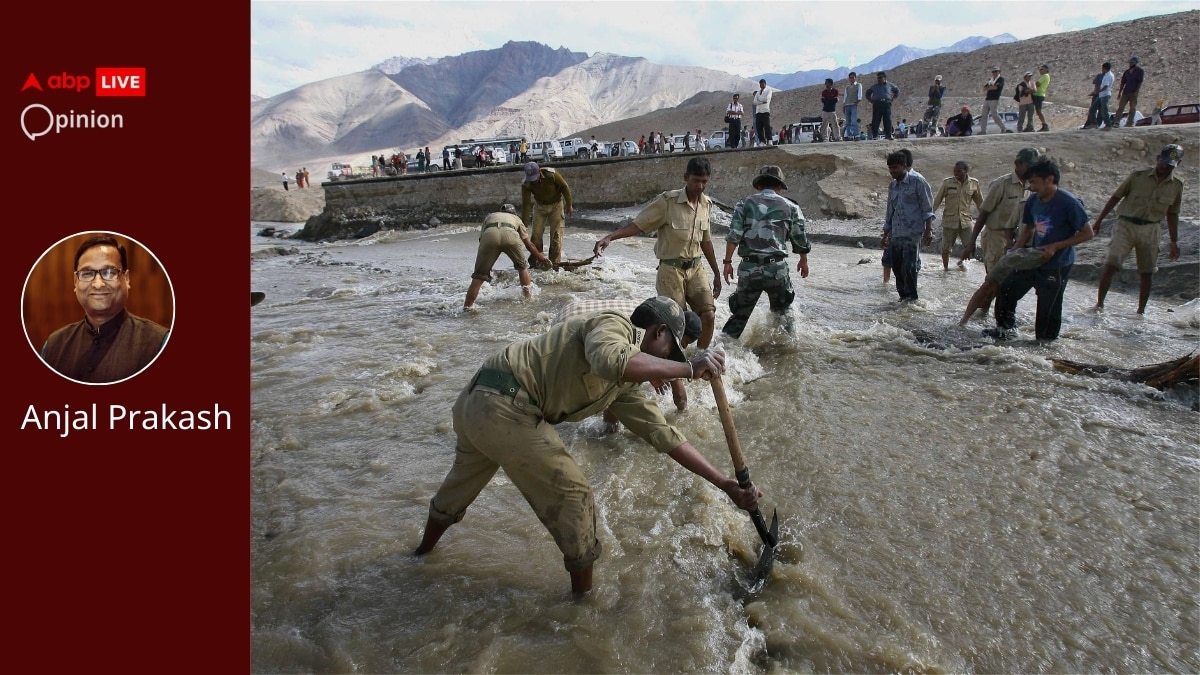<p><span style=”font-weight: 400;”>The suspension of the Indus Waters Treaty (IWT) by India on April 23, 2025, following the Pahalgam terrorist attack represents a pivotal moment in South Asian geopolitics. It intricately entwined with the complex dynamics of water security in the region. The IWT, established in 1960, has long been the framework governing the distribution of water from the Indus river system between India and Pakistan. This unilateral decision by India, spurred by deteriorating relations and recent tragic events, underscores the precarious balance between water resources and national security.</span></p>
<p><span style=”font-weight: 400;”>The backdrop of this suspension is marked by a devastating terrorist attack in the Kashmir tourist region of Pahalgam, which claimed numerous civilian lives. In response to this brutality, India’s leadership has opted to wield its position as an upper riparian state — gaining control over critical water flows to Pakistan. </span></p>
<h2><strong>Indus: The Lifeblood Of Pakistan’s Agriculture & Economy</strong></h2>
<p><span style=”font-weight: 400;”>The Indus river holds a centre stage in Pakistan, as it single-handedly maintains the country’s agriculture while providing food security for millions. The Indus system also contains its tributaries, which are Jhelum, Chenab, Ravi, Beas and Sutlej, with an impressive irrigation system of more than 64,000 kilometres of canals. It caters over 1.6 million sq km of cultivated land, serving a large part of the rural population, about 70% of which is dependent on agriculture. </span></p>
<p><span style=”font-weight: 400;”>The Indus Basin Irrigation System (IBIS) is the most sophisticated continuous irrigation system on the planet, allowing farmers to grow a broad range of crops throughout the year. This stunning system of irrigation raises agricultural productivity. Yielding more pulse crops, in addition to the strategic grains of the state such as wheat and rice, as well as fruits undergo enhancement. Such increased agricultural output provides not only increased availability of food but also diversity for better nutrition. </span></p>
<p><span style=”font-weight: 400;”>The IBIS also plays an important role in managing hydrological resources through a system of dams such as Tarbela, Mangla and others which facilitate hydropower generation and flood control activities. Their reservoirs aid in the fight against floods by capturing surplus water during heavy rains so as to guarantee supply despite changing climatic conditions. As a shared transboundary resource, the Indus strengthens relations between the basin countries, and aids in the stabilisation of water-scarce regions of the country. The river not only has tremendous economic impact, but also enhances the development, transport, and navigational activities of Pakistan, which aids in the construction of a new Pakistan.</span></p>
<h2><strong>Water As A Strategic Weapon </strong></h2>
<p><span style=”font-weight: 400;”>The Indus River system consisting of the Indus and its tributaries is vital for both nations, but it is Pakistan that depends more heavily on the western rivers allocated to it under the treaty. By suspending the IWT, India now has the latitude to reshape its water management policies in a way that could substantially impact water availability for Pakistan, particularly during crucial agricultural seasons.</span></p>
<p><span style=”font-weight: 400;”>For Pakistan, the implications are dire. The country relies extensively on the Indus River system for its irrigation needs, with agriculture forming the backbone of its economy. With the treaty’s suspension, the threat to water security looms large, exacerbating an existing crisis fuelled by climate change, population growth, and inefficient water management. This precarious situation raises the specter of acute water shortages, which could have devastating repercussions for food security and livelihoods across the nation.</span></p>
<h2><strong>Impact On Pakistan’s Agriculture, And </strong><strong>Strategic Gains For India</strong></h2>
<p><span style=”font-weight: 400;”>The timing of reduced water flows could not come at a worse moment, particularly as farmers prepare for sowing seasons. As irrigation becomes increasingly tenuous, the potential for diminished crop yields grows, posing risks not only to the economy but also to inflation and food prices. The resulting economic strain may heighten social unrest, as communities grapple with the harsh realities of water scarcity, leading to broader political instability that could fracture inter-provincial relations and incite conflict.</span></p>
<p><span style=”font-weight: 400;”>Moreover, Pakistan’s position as a lower riparian state is further complicated by the international implications of this suspension. Relying on the IWT as a crucial framework, Pakistan may find itself isolated diplomatically, struggling to garner support from other nations that could mediate in this escalating dispute. The need for international community engagement becomes ever more pressing, as stakeholders grapple with the ramifications of water rights and regional stability.</span></p>
<p><span style=”font-weight: 400;”>Conversely, India’s strategic calculus benefits significantly from this decision. By suspending the treaty, India effectively reasserts its leverage as the upper riparian nation, allowing greater control over critical water resources. This shift provides an opportunity to pursue hydropower development in Indian-administered territories without the constraints imposed by the IWT. Enhanced energy security becomes all the more crucial as India addresses its growing domestic demands while simultaneously bolstering its position in regional politics.</span></p>
<h2><strong>Water Politics And Climate Resilience In South Asia</strong></h2>
<p><span style=”font-weight: 400;”>The ability to manage flood control measures becomes a tangible advantage as well. Without the obligation to share data regarding water levels and flood risks with Pakistan, India can implement measures that optimise water management in its territories. As climate change continues to exacerbate weather events, the capacity to handle floods and mitigate disasters solidifies India’s stature as a resilient state ready to confront contemporary challenges.</span></p>
<p><span style=”font-weight: 400;”>The implications of this suspension also extend into the realm of domestic politics. By framing the treaty’s suspension as a robust response to terrorism, the Indian government crafts a narrative of resilience that resonates with its populace. This narrative shifts public focus towards a united front against external threats, fostering national solidarity and enhancing governmental support both domestically and in the global arena.</span></p>
<p><span style=”font-weight: 400;”>In essence, this suspension illustrates the intricate relationship between water politics and national security in South Asia. While India gains a tactical advantage, Pakistan faces potential consequences that threaten its overall stability and water security. As tensions escalate, it becomes increasingly clear that constructive dialogue is essential. Innovative approaches to water resource management, emphasising cooperation over conflict, are urgently needed to foster equitable solutions.</span></p>
<p><span style=”font-weight: 400;”>The international community, particularly the World Bank, which played a crucial role in establishing the original treaty, now bears the responsibility of facilitating discussions. In an era where water scarcity threatens the foundation of stability, the path forward must prioritise collaborative efforts to reestablish trust and cooperation in the region, ensuring that water serves as a bridge rather than as a weapon. </span></p>
<p><em>Anjal Prakash</em><em><span style=”font-weight: 400;”> is a Clinical Associate Professor (Research) and Research Director at Bharti Institute of Public Policy, Indian School of Business (ISB). </span></em></p>
<div id=”article-hstick-inner” class=”abp-story-detail abp-story-detail-blog”>
<p><strong>[Disclaimer: The opinions, beliefs, and views expressed by the various authors and forum participants on this website are personal and do not reflect the opinions, beliefs, and views of ABP News Network Pvt Ltd.]</strong></p>
</div>
World
Opinion: India Is Using Water As A Strategic Weapon, This Will Cut Off Pakistan’s Lifeblood
by aweeincm

Recent Post

Ex-Pakistan Star Slams Deputy PM For Calling Pahalgam Attack Terrorists ‘Freedom Fighters’
Former Pakistan cricket team spinner Danish Kaneria slammed Deputy Prime ... Read more

UN Chief Guterres Urges ‘Maximum Restraint’ Amid Escalating Tensions Between India, Pakistan
<p>UN Secretary-General Antonio Guterres is following the situation between India ... Read more

Trump Asks Supreme Court To Allow Banning Transgender People In Military
<p>The Donald Trump administration has urged the US Supreme Court ... Read more

Plane Crashes In Sea Near Thailand’s Hua Hin Airport, 6 Dead: VIDEO
<p>A plane crash in Thailand has killed all 6 people ... Read more